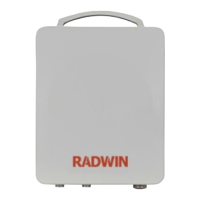RADWIN 2000 User Manual Release 2.6.40 16-1
Chapter 16
FCC/IC DFS Installation
Procedure
FCC/IC 5.4/5.3 GHz Links: Background
The FCC/IC regulation for 5.4/5.3 GHz allows unlicensed wireless data equipment, provided
that it does not interrupt radar services. If radar activity is detected, the equipment must
automatically change frequency channel. This feature is termed Dynamic Frequency Selection
(DFS). According to the standard, a channel with active radar is prohibited from use for 30
minutes. Before using a channel for transmission, the radio equipment must probe it for radar
signals for a period of 60 seconds.
RADWIN radio products support DFS as well as ACS.
An immediate consequence of the FCC/IC regulation for 5.4/5.3 GHz is that the standard
method of link installation using a single default fixed installation channel, cannot be used.
Instead of the installation procedure of Chapter 5, a link activation method is used.The
ODUs do not transmit until they are both configured and in place. An activation button may
be found by navigating to Site:Location|Air Interface.
The ODUs are either supplied from the factory ready for use at 5.4 GHz or 5.3 GHz FCC/IC or
alternatively, they can be set up for these bands using the RADWIN Manager.
Note
The FCC/IC regulations for 5.4 GHz band requires the frequency range 5600
– 5650 MHz to be banned from use. The FCC regulation for 5.4 GHz band
requires that within 35 km radius from any (Terminal Doppler Weather
Radars) TDWR location the frequency range 5570 – 5680 MHz shall be
banned from use.
Follow the instructions in the last section of this chapter.
Note
The following procedure is generic to all relevant RADWIN radio products.
What you see on your running RADWIN Manager may differ in some details
from the screen captures used to illustrate this chapter.

